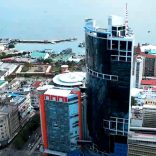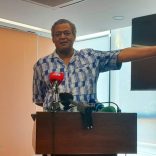Mozambique: Still no date for the start of the N1 rehabilitation - Watch
Mozambique: Sovereign fund rules do not assure stability, autonomy – civil group

in file CoM
The civic movement for the Sovereign Wealth Fund of Mozambique on Thursday criticised the fund’s regulations for failing to guarantee the “stability” of the funding of this account and the independence of the mechanism’s governing bodies.
On 12 March, Mozambique’s Cabinet approved the proposal for the regulations of the Mozambique Sovereign Fund (FSM), a mechanism that will be financed by natural gas revenues.
Commenting on the regulation in statements to Lusa, the leader of the civic movement for Mozambique’s Sovereign Fund, Fátima Mimbire, criticised the formula for calculating the funds earmarked for the account, stressing that “there is greater primacy for funding from the state budget”.
“The formula found does not give stability to the allocation of resources to the fund and creates unpredictability in relation to the volume of resources destined for the fund, giving primacy to the financing of the state budget,” said Mimbire.
The volatility of the amounts to be channelled creates uncertainty about the usefulness of the fund for future generations, which is the main purpose of the mechanism, added the social activist.
By giving greater preference to the budget, she continued, the regulation exposes gas revenues to the risks inherent in the poor execution of public accounts, because there is no clear definition of the amounts to be channelled to priority areas such as health, education and social assistance for the most vulnerable.
The activist also criticised the “discretionary power” given to the government in the formation of the Advisory Council, creating the risk of conditioning the actions of that body: “It is not determined how the members of the fund’s Advisory Council will be selected, which could allow the composition to be at the government’s discretion.”
On 15 December, the Mozambican parliament approved the creation of the FSM with revenues from natural gas exploration, which by the 2040s should reach US$6 billion (€5.5 billion) a year, despite widespread criticism from the opposition, which voted against it, doubting how it will be managed.
Mimbire argued that an independent commission should be set up to select the members of the council, so that they are not conditioned by the executive.
The same doubt arises in relation to the FSM’s supervisory committee, which should be chosen by the parliament, but without the origin of its members being defined.
“Where will the members of the fund’s supervisory committee who will be selected by parliament come from? From civil society or from political parties? These doubts should be clarified in the regulation, because going into detail is the vocation of the regulation and not the law,” said Fátima Mimbire.
Mimbire said that civil society had expressed its concerns to the government in consultation sessions, but the final product of the regulation shows that these contributions were ignored.
“We felt that the government was very receptive to our concerns, but the end result is frustrating,” she emphasised.
When he announced the approval of the draft FSM Regulation, the deputy minister of the economy and finance, Amílcar Tivane, said that the instrument would be operational in April: “Our expectation is that all the work on creating instruments to ensure the viability of the fund will be completed by the end of this month. And so we can say that by the end of March, beginning of April, the FSM will be up and running.”
The regulation, Tivane explained, establishes “the guidelines for governance” by the various bodies that include the FSM’s decision-making structure, namely The Mozambican parliament, the government and the Bank of Mozambique, as well as the Operational Manager, the Supervisory Committee and the Advisory Council.
“It also defines the procedures for ensuring the transfer of resources associated with the exploitation of liquefied natural gas, and also revenues from the exploitation of future projects in the oil and gas area, setting the proportion at 60% for the state budget and 40% for the sovereign fund account for the first 15 years. And from the 16th year onwards in a proportion of 50%, 50%,” Tivane explained.













Leave a Reply
Be the First to Comment!
You must be logged in to post a comment.
You must be logged in to post a comment.